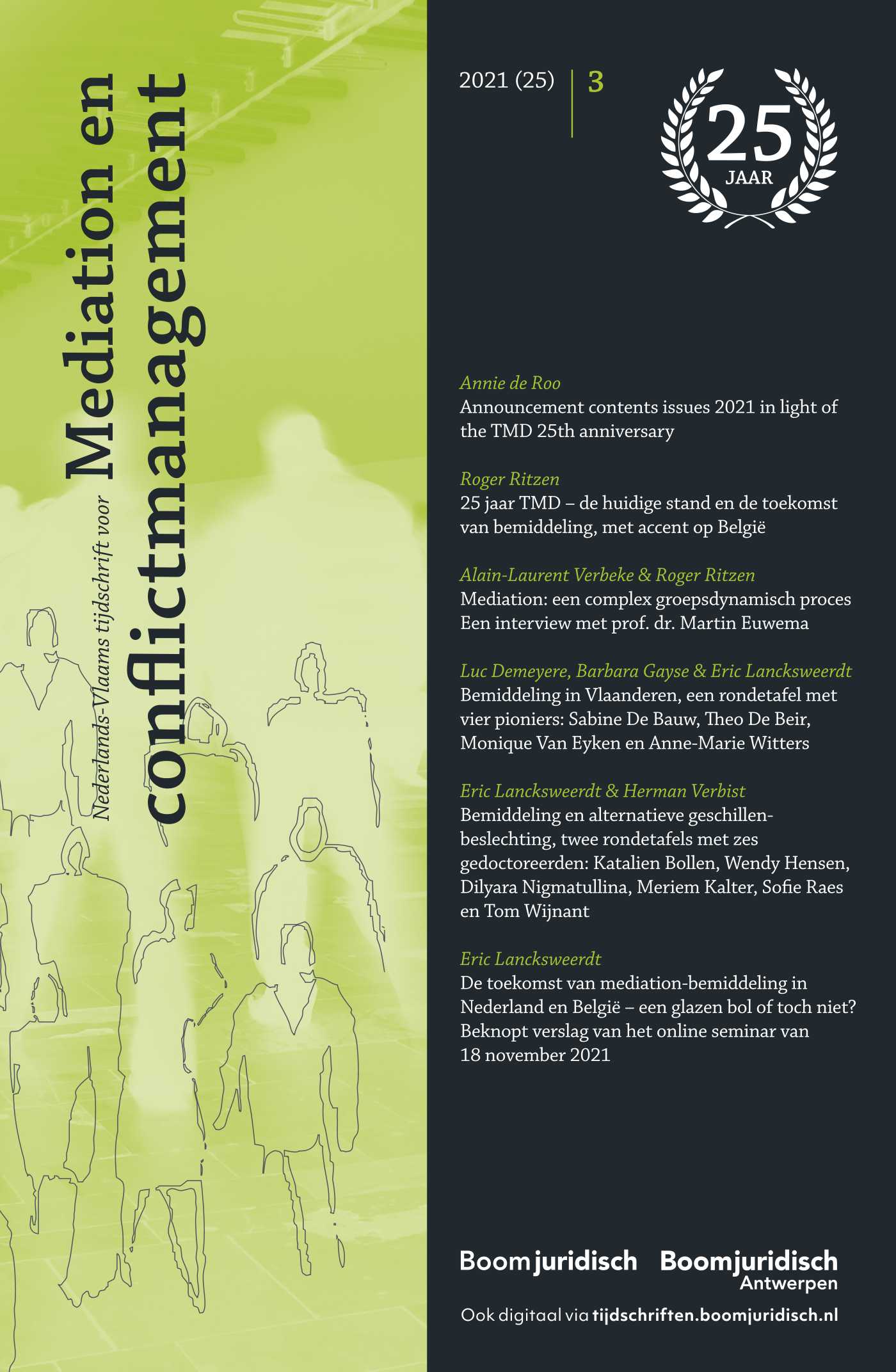|
In this article the authors summarize the current position of tax mediation in the Netherlands and pay attention to several differences between mediation in Belgium and the Netherlands. They also outline the recent developments in order to the proposed mediation legislation and the options for using mediation in tax fraud cases. Mediation legislation could be the incentive that tax mediation needs. |


Nederlands-Vlaams tijdschrift voor mediation en conflictmanagement
Meer op het gebied van Mediation en herstelrecht
Over dit tijdschriftMeld u zich hier aan voor de attendering op dit tijdschrift zodat u direct een mail ontvangt als er een nieuw digitaal nummer is verschenen en u de artikelen online kunt lezen.
| Redactioneel |
Goed geregeld? |
| Auteurs | Rob Jagtenberg |
| Auteursinformatie |
| Redactioneel |
Well-regulated, well settled? |
| Auteurs | Rob Jagtenberg |
| Auteursinformatie |
| Artikel |
De ontwikkelingen op het gebied van fiscale mediation in Nederland |
| Trefwoorden | Mediation, Fiscale bemiddeling, Fiscale strafzaken, Mediationwetgeving |
| Auteurs | Roelof Vos en Diede Molenaars |
| SamenvattingAuteursinformatie |
| Artikel |
De nieuwe deontologische code van de Belgische erkende bemiddelaars |
| Trefwoorden | deontologische code, FBC, Belgisch Gerechtelijk wetboek, erkende bemiddelaars |
| Auteurs | Eric Lancksweerdt |
| SamenvattingAuteursinformatie |
|
Pursuant to Article 1727, § 2, 5 of the Belgian Judicial Code, the federal mediation commission, which manages the mediation process in Belgium, must draw up a code of ethics. After drawing up a code of conduct in 2007, she recently developed a new code of ethics on 16 December 2020. The main lines of this code of ethics are discussed in this contribution. |
| Artikel |
De nieuwe Belgische deontologische code van de erkende bemiddelaars: een schoolvoorbeeld van hoe het niet moet |
| Trefwoorden | deontologische code, FBC, erkende bemiddelaars, faciliterend model, evaluatief model |
| Auteurs | Patrick Van Leynseele |
| SamenvattingAuteursinformatie |
With this article Patrick Van Leynseele would like to briefly outline: |
| Artikel |
Belgische Deontologische Code |
| Trefwoorden | deontologische code, FBC, toepassingsveld, bemiddelingsprotocol, bemiddelingstraject |
| Artikel |
Status of a mediated settlement agreement from a German law perspective |
| Trefwoorden | settlement, agreement, enforceability, mediation |
| Auteurs | Judith Wollstädter |
| SamenvattingAuteursinformatie |
|
Phase 5 of a mediation process aims at the participants’ reaching an agreement that is complete, fair, feasible and enforceable. Its legal nature is primarily dependent on the wishes of the parties. It can comprise legally non-binding statements, agreements on the parameters of future contracts, and even legally binding declarations of intent concerning contested claims. |
| Artikel |
30 Years of CEDR |
| Trefwoorden | CEDR, ADR, Eileen Carroll, history, evolution |
| Auteurs | Karl Mackie |
| SamenvattingAuteursinformatie |
|
Karl Mackie writes some thoughts on CEDR’s experience, giving insights into the growth of ADR and strategies for change. He expects there will be a major demand for strategies for change on many fronts as the world comes out of a pandemic, so there may be some more generic lessons for readers with new ambitions as well as insights into ADR. |
